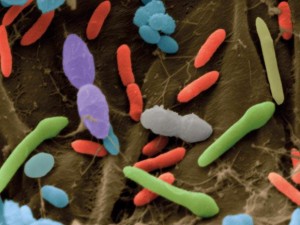We need to be aware that probiotics are important for your health. Growing up in Germany after World War II I remember that occasionally there were interesting newspaper headings. It showed an older person in the nineties when the average life expectancy was in the late 60’s. The reporter asked, “What did you do to turn that old?” The answer was that the person always ate a lot of yogurt.
This did not sink into mainstream medicine at that time and people did not really believe this statement. How could eating yogurt make a person live longer?
Fast forward to 2014. You read about probiotics in magazines, on the Internet, and even TV commercials expose you to it.
In the Wikipedia it is accepted that yogurt can help seniors who have a lower bifidus bacteria population in their colon to rebalance their gut flora, which will prevent colon cancer. It also describes that yogurt can help yeast infections in women.
In the meantime probiotics have been developed and concentrations like 20 to 80 billion bacteria per capsule with a mix of Lactobacillus and Bifidobacterium species are available in the health food store for prevention.
The medical profession has studied the effects of higher potency probiotics and came to the conclusion that probiotics have indeed effects on the body far beyond the gut.
Here are a few highlights.
Bowel disease improves
In cases of bacterial or viral diarrhea the frequency of bowel movements and the intensity of bowel cramps gets helped within a few days, and recovery from the diarrhea is much faster with probiotic than without. Patient with irritable bowel syndrome and ulcerative colitis are helped with probiotics. Probiotics help both constipation and diarrhea in otherwise healthy people as well.
Immune system booster
The small bowel contains clusters of immune cells within the bowel wall. Together they are a formidable immune organ in the gut, which connects to the blood and the rest of the immune system throughout the body (lymph glands, spleen, bone marrow). Specifically it has been proven in humans that macrophages, natural killer (NK) cells and cytotoxic T-lymphocytes, which are the working horses of the immune system, are all stimulated by probiotics.
Less respiratory infections
School children who were given 1 capsule of probiotics twice per day for 3 months and flu symptoms and absenteeism were observed due to colds and flus. When they did get a viral infection, the illness had a shorter course, resulting in much less school absenteeism over the course of the trial when compared to a placebo group. It seems that a healthy gut flora stimulates the immune system to work at its best.
Cancer prevention
To a certain degree cancer can be prevented by probiotics and other nutritional factors. Breast cancer is one of the cancers where probiotics have been shown to be effective in reducing disease.
Apparently the probiotic bacteria bind to the cancer causing factors (carcinogens) that some of the bad gut bacteria produce. Probiotics also suppress other bacteria that convert pro-carcinogens into carcinogens. This is not all: the probiotics also interfere with enzymes involved in the production of carcinogens in the gut. This stimulates the gut immune cells to produce cytokines that are needed in the battle against early cancer. Probiotics play a role in multiple processes that help the body to fight cancer, not only in the gut, but also in the rest of the body!
Helps diabetes get better
How can gut bacteria help diabetes, which is an endocrinological disease? Both human and animal studies have shown that insulin resistance is improved by probiotics. In a 6-week study both blood sugar levels and hemoglobin A1C values (that measure long-term control of diabetes) dropped significantly by eating 300 grams of yoghurt per day when compared to a control group who did not.
Obesity
Probiotics given to mothers at least one month prior to birth and at least up to 6 months after birth prevented excessive weight gain in both the mothers and their children. In addition, probiotics can suppress a lot of the inflammatory substances in obesity.
Probiotics reduce cardiovascular risk
Several studies have shown that probiotics lower LDL cholesterol, total cholesterol and inflammatory markers in the blood stream resulting in lower risk for hardening of the arteries.
One should not look at probiotics as a single factor for prevention of heart attacks and strokes. Combine probiotics with exercise and a low refined carbohydrate diet. High sugar and starch diets lead to absorption of sugar in the stomach and small intestine. This results in a lack of nutrients to support the gut flora. Combine probiotics with vegetables and lettuce. Then you have the proper mix of fiber, minerals and other nutrients to sustain balanced bacteria in the bowels. This prevents heart attacks and strokes and keeps inflammatory markers down. I have blogged about this before and stated that the combination of organic food (to avoid antibiotic residues in our diet), fruit and vegetables combined with probiotics will protect you from heart attacks and strokes.
Conclusion
Maybe the newspaper articles in Germany after the Second World War were right. There is something in yogurt (Lactobacillus and Bifidobacterium species) that can make you live longer. The explanation seems simple: add probiotics to your diet. You will have a better immune system and get less respiratory infections. But you also prevent heart attacks, strokes and prevent obesity and cancer. All of this in combination will lead to healthier lives, and more people will live to tell about it.
Last edited Sept. 3, 2014








